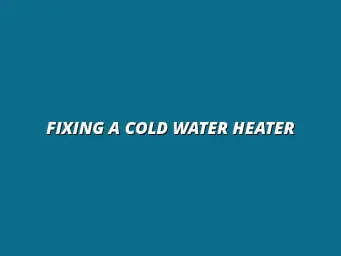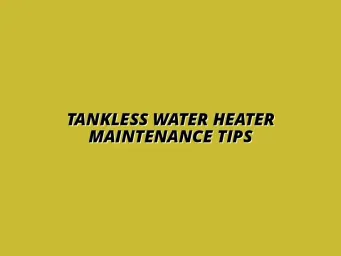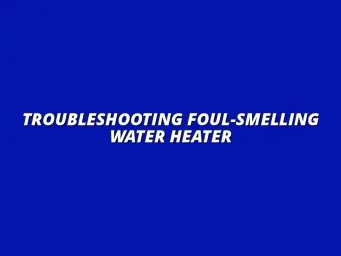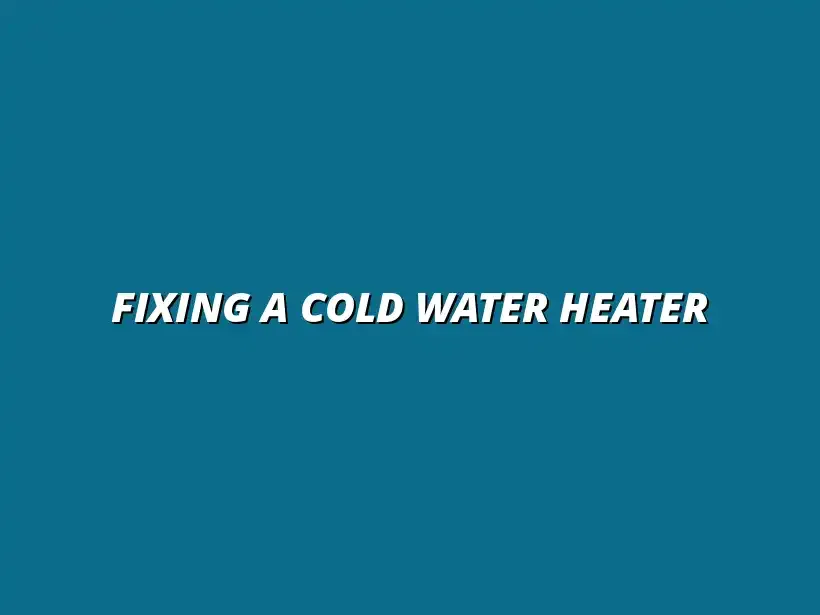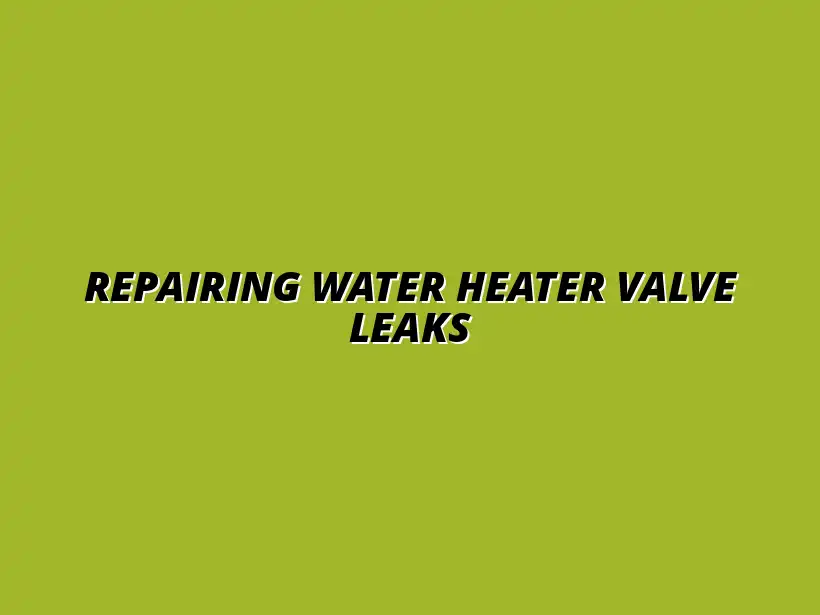
Repairing Water Heater Valve Leaks
Understanding Water Heater Valve Leaks
When it comes to water heaters, one of the most common problems you might face is valve leaks. These leaks can lead to water damage, increased utility bills, and even safety hazards. Understanding the different types of water heater valve leaks is crucial so you can address them effectively and prevent further issues!
In this section, I'll delve into the most common types of valve leaks you might encounter, helping you identify them if they occur. By knowing what to look for, you can take the right steps to either fix the problem yourself or call in a professional for help. If you're dealing with a more extensive plumbing issue, such as a leaking bathroom pipe joint, you might need additional expertise.
Identifying the Common Types of Water Heater Valve Leaks
Water heater valve leaks can happen for a variety of reasons, but it's essential to pinpoint which type of leak you are dealing with. The most common types include pressure relief valve leaks, temperature and pressure relief valve (T&P valve) issues, and drain valve leaks. Let’s explore each one!
- Pressure Relief Valve Leaks: These often occur when excessive pressure builds up in the tank.
- Temperature and Pressure Relief Valve (T&P Valve) Issues: This type can cause leaks if the water temperature or pressure exceeds safe levels.
- Drain Valve Leaks: These usually happen during maintenance or if the valve becomes corroded.
Pressure Relief Valve Leaks
The pressure relief valve is a critical safety feature of your water heater. It releases excess pressure to prevent the tank from bursting. If this valve is leaking, it may indicate that there's too much pressure in the tank, which could be very dangerous.
You'll often see water trickling down the side of the heater or pooling on the floor. If you notice this, it's essential to act quickly! Check the valve and the surrounding area for any additional signs of pressure problems. For more in-depth information on repairing water heater issues, check out this comprehensive guide on repairing a water heater valve.
Temperature and Pressure Relief Valve (T&P Valve) Issues
Similar to the pressure relief valve, the T&P valve is designed to release excess pressure and temperature. If this valve is malfunctioning, you may see water leaking from the valve itself. This could be due to a failure to open when needed or simply a worn-out part.
It's important to replace faulty T&P valves promptly, as they play a crucial role in keeping your water heater safe. Regular inspections can help catch issues before they escalate. Learning how to fix a leaking water heater can save you money and time in the long run.
Drain Valve Leaks and Their Causes
The drain valve is used to remove sediment from the tank and sometimes to perform maintenance. Leaks from this valve can happen for various reasons, including corrosion, wear and tear, or improper usage. If you notice wet spots beneath the valve, it’s time to investigate!
- Corrosion over time can weaken the valve.
- Improper installation can lead to leaks.
- Frequent opening and closing of the valve can wear it out.
Addressing a leaking drain valve right away can save you from larger repairs down the line. Keeping an eye on these valves during regular maintenance checks is a smart move! Understanding the root causes can also help prevent future issues; learn more about water heater leak causes and fixes.
Analyzing the Causes of Water Heater Valve Leaks
Now that we have a good understanding of the types of leaks, we can look into what causes these issues to occur. From corrosion to improper installation, several factors can lead to water heater valve failures. By identifying these causes, you can take preventive measures to extend the life of your water heater.
Addressing Common Questions about Water Heater Valve Leaks
Dealing with a leaking water heater valve can be stressful, but knowing what to do can ease your concerns. Many homeowners have similar questions when they encounter this issue. In this section, I’ll address some of the most common questions and provide clear steps you can take to tackle these leaks effectively. Sometimes, a clogged drain can be the root cause of unexpected leaks; learn how to unclog your drain without plumbing expertise.
What Should I Do If My Water Heater Valve is Leaking?
When you notice a leak, it’s important to act quickly. First off, you should immediately turn off the power supply and water supply to your water heater to prevent any further damage. By doing this, you’ll minimize the risk of flooding or electrical issues while you work on a solution.
Next, assess the situation closely. You need to determine whether the leak is minor or significant. This will help you decide if you can handle the repair yourself or if you need a professional's help. A dishwasher that won't drain can sometimes create plumbing issues; here's how to fix a dishwasher that won't drain.
- Check the water around the valve: Is it a small drip, or is it gushing?
- Inspect the valve itself for visible wear or damage.
- Look for signs of rust or corrosion, which may indicate a more serious issue.
Immediate Steps to Take Before Repairs
Before you start any repairs, there are a few immediate actions you can take to ensure safety and prevent further issues. Make sure to follow these steps:
- Shut off the water supply to the heater.
- Turn off the electricity or gas supply based on your water heater type.
- Drain the water heater if the leaks are significant to prevent overflow.
Assessing the Severity of the Leak
Understanding how severe the leak is can determine your next actions. If you observe a steady stream of water, it’s likely time to replace the valve. Conversely, if it’s just a small drip, you might be able to tighten fittings or replace a washer instead.
A good rule of thumb is to continuously monitor the leak for a few hours. If it persists or worsens, it’s best to address it sooner rather than later. For professional help in Birmingham, consider contacting a plumber in Alcester, Birmingham.
How Often Should Water Heater Valves Be Inspected?
Regular inspections of your water heater valves are crucial for avoiding leaks and ensuring your system runs efficiently. Knowing when to inspect can save you from costly repairs down the line. Generally, I recommend doing an inspection at least once a year.
However, there are certain situations where you should inspect your water heater valves more frequently. These include:
- When you’ve recently noticed any leaks.
- After any major weather events that may affect your plumbing.
- If your water heater is more than 10 years old.
Recommended Inspection Timelines
It's a good idea to set a reminder for annual inspections of your water heater. This way, you can catch potential issues early. If you notice any signs of trouble, don’t wait for your scheduled inspection—do it sooner!
Signs Indicating an Immediate Inspection is Necessary
Look out for these signs that suggest you need an immediate inspection:
- Visible leaks or puddles near the valve.
- Strange noises coming from the water heater.
- Unusual fluctuations in water temperature.
Summarizing Key Takeaways for DIY Fixes
When it comes to fixing water heater valve leaks, having a game plan is essential. By following the tips and guidelines shared in this article, you’ll be well-equipped to handle most minor repairs. Here are some key takeaways to keep in mind for future reference.
Final Thoughts on Preventing Future Water Heater Valve Leaks
Regular maintenance is your best defense against water heater valve leaks. By checking your system regularly, you can catch problems before they escalate. A little attention can go a long way in extending the life of your water heater!
Importance of Regular Maintenance and Inspection
Remember, taking the time to inspect and maintain your water heater can save you money and headaches in the future. Some simple maintenance steps include:
- Flushing the tank annually to remove sediment buildup.
- Checking and replacing the anode rod every few years.
- Looking for signs of wear on the valves.
When to Seek Professional Help to Avoid DIY Mistakes
If at any point you feel unsure about your ability to fix a leak, don’t hesitate to call in a professional. It’s always better to be safe than sorry, especially when working with plumbing and electrical systems.
Encouraging Safe and Effective DIY Repairs
Understanding the basics of water heater valve repairs can empower you as a homeowner. With the right knowledge, you can confidently tackle minor issues and maintain your water heater effectively.
Reinforcing Best Practices Learned in the Article
Throughout this article, we’ve discussed various practices to ensure your water heater remains in good shape. Keeping safety in mind, using the right tools, and regularly inspecting your system should be top of your priority list.
Promoting Confidence in Home Repairs
As you embark on your DIY repair journey, remember to trust your instincts! With practice and the right information, you’ll gain confidence in handling future plumbing tasks. Happy repairing!
